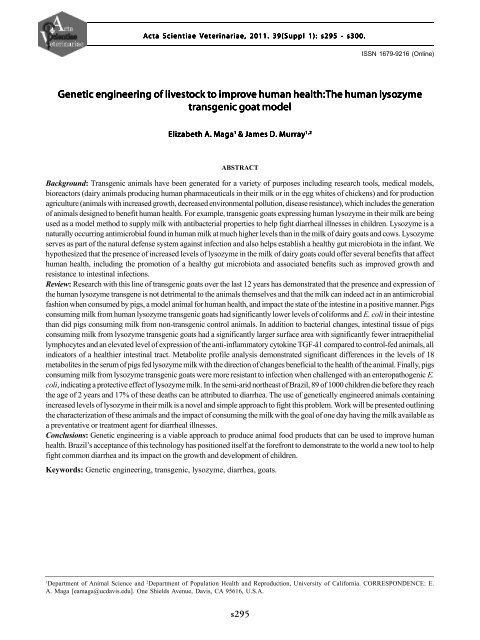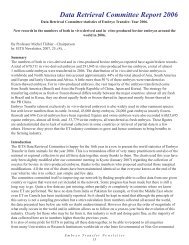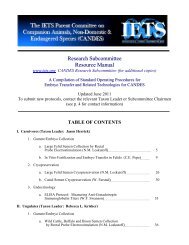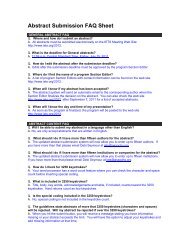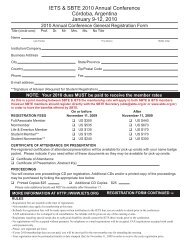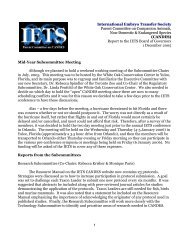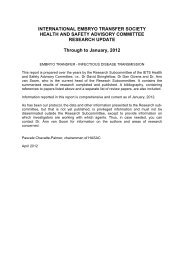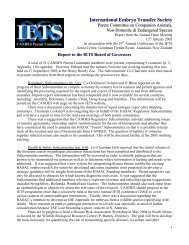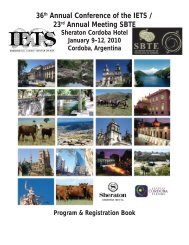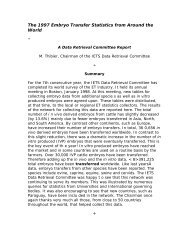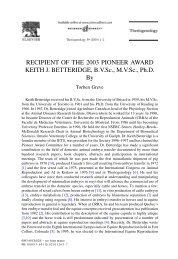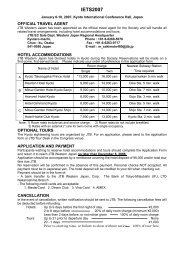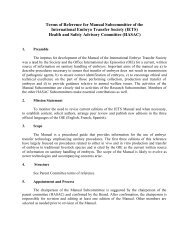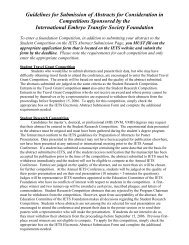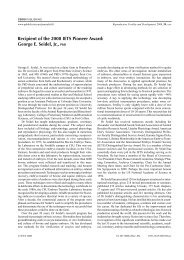- Page 1 and 2:
Proceedings of the 25 th Annual Mee
- Page 3 and 4:
Acta Scientiae Veterinariae. 39 (Su
- Page 5:
Acta Scientiae Veterinariae. 39 (Su
- Page 8 and 9:
Acta Scientiae Veterinariae. 39 (Su
- Page 10 and 11:
Acta Scientiae Veterinariae. 39 (Su
- Page 12 and 13:
Acta Scientiae Veterinariae. 39 (Su
- Page 14 and 15:
Acta Scientiae Veterinariae. 39 (Su
- Page 16 and 17:
Acta Scientiae Veterinariae. 39 (Su
- Page 18 and 19:
Acta Scientiae Veterinariae. 39 (Su
- Page 20 and 21:
Acta Scientiae Veterinariae. 39 (Su
- Page 22 and 23:
A262 Bovine Oocyte Vitrification: E
- Page 25 and 26:
C.A. Rodr drigues igues, R.M. Fer e
- Page 27 and 28:
C.A. Rodr drigues igues, R.M. Fer e
- Page 29 and 30:
C.A. Rodr drigues igues, R.M. Fer e
- Page 31 and 32:
C.A. Rodr drigues igues, R.M. Fer e
- Page 33 and 34:
C.A. Rodr drigues igues, R.M. Fer e
- Page 35:
C.A. Rodr drigues igues, R.M. Fer e
- Page 38 and 39:
L.F. Nasser asser, L. Pen enteado e
- Page 40 and 41:
L.F. Nasser asser, L. Pen enteado e
- Page 42 and 43:
L.F. Nasser asser, L. Pen enteado e
- Page 44 and 45:
L.F. Nasser asser, L. Pen enteado e
- Page 46 and 47:
R.B. Lôbo, D. Nkr uman, D.A. Gross
- Page 48 and 49:
R.B. Lôbo, D. Nkr uman, D.A. Gross
- Page 51 and 52:
M.E.F .F. Oliv liveir eira. 2011. E
- Page 53 and 54:
M.E.F .F. Oliv liveir eira. 2011. E
- Page 55 and 56:
M.E.F .F. Oliv liveir eira. 2011. E
- Page 57:
M.E.F .F. Oliv liveir eira. 2011. E
- Page 60 and 61:
A.L. Gusmão usmão. 2011. Estado d
- Page 62 and 63:
A.L. Gusmão usmão. 2011. Estado d
- Page 64 and 65:
A.L. Gusmão usmão. 2011. Estado d
- Page 66 and 67:
J. R. Figueir igueiredo edo, A.P.R.
- Page 69 and 70:
E.L.A. Motta, M. Nichi & P.C. Ser e
- Page 71 and 72:
E.L.A. Motta, M. Nichi & P.C. Ser e
- Page 73 and 74:
E.L.A. Motta, M. Nichi & P.C. Ser e
- Page 75 and 76:
E.L.A. Motta, M. Nichi & P.C. Ser e
- Page 77:
E.L.A. Motta, M. Nichi & P.C. Ser e
- Page 80 and 81:
E.L.Gastal, M.O. Gastal, A. Wischra
- Page 82 and 83:
E.L.Gastal, M.O. Gastal, A. Wischra
- Page 84 and 85:
E.L.Gastal, M.O. Gastal, A. Wischra
- Page 86 and 87:
E.L.Gastal, M.O. Gastal, A. Wischra
- Page 88 and 89:
E.L.Gastal, M.O. Gastal, A. Wischra
- Page 90 and 91:
E.L.Gastal, M.O. Gastal, A. Wischra
- Page 92 and 93:
E.L.Gastal, M.O. Gastal, A. Wischra
- Page 95 and 96:
D.P .P.A.F .A.F. Braga & E. Bor org
- Page 97 and 98:
D.P .P.A.F .A.F. Braga & E. Bor org
- Page 99 and 100:
D.P .P.A.F .A.F. Braga & E. Bor org
- Page 101 and 102:
D.P .P.A.F .A.F. Braga & E. Bor org
- Page 103:
M.E.F .F. Oliv liveir eira. 2011. E
- Page 106 and 107:
F.F .F. Bressan, F. Per erecin, eci
- Page 108 and 109:
F.F .F. Bressan, F. Per erecin, eci
- Page 110 and 111:
F.F .F. Bressan, F. Per erecin, eci
- Page 112 and 113:
F.F .F. Bressan, F. Per erecin, eci
- Page 114 and 115:
F.F .F. Bressan, F. Per erecin, eci
- Page 116 and 117:
F.F .F. Bressan, F. Per erecin, eci
- Page 119 and 120:
C.E. Ambrósio mbrósio, C.V. Wenc
- Page 121 and 122:
C.E. Ambrósio mbrósio, C.V. Wenc
- Page 123:
C.E. Ambrósio mbrósio, C.V. Wenc
- Page 127 and 128:
J.C. Fer erreir eira, F.S. Ignácio
- Page 129 and 130:
J.C. Fer erreir eira, F.S. Ignácio
- Page 131 and 132:
J.C. Fer erreir eira, F.S. Ignácio
- Page 133:
J.C. Fer erreir eira, F.S. Ignácio
- Page 136 and 137:
R.C. Uliani, L.A. Silv ilva, M.A. A
- Page 138 and 139:
R.C. Uliani, L.A. Silv ilva, M.A. A
- Page 140 and 141:
F.S. Ignácio, J.C. Fer erreir eira
- Page 142 and 143:
F.S. Ignácio, J.C. Fer erreir eira
- Page 145 and 146:
L.A. Silva. 2011. Local Effect of t
- Page 147 and 148:
L.A. Silva. 2011. Local Effect of t
- Page 149 and 150:
L.A. Silva. 2011. Local Effect of t
- Page 151 and 152:
L.A. Silva. 2011. Local Effect of t
- Page 153 and 154:
L.A. Silva. 2011. Local Effect of t
- Page 155 and 156:
L.A. Silva. 2011. Local Effect of t
- Page 157 and 158:
M.M. Franc anco, A. Pellegr ellegri
- Page 159 and 160:
M.M. Franc anco, A. Pellegr ellegri
- Page 161 and 162:
B. Str troud & G.A. Bó. 2011. The
- Page 163 and 164:
B. Str troud & G.A. Bó. 2011. The
- Page 165 and 166:
B. Str troud & G.A. Bó. 2011. The
- Page 167 and 168:
B. Str troud & G.A. Bó. 2011. The
- Page 169 and 170:
W.W .W. Tha hatcher cher. 2011. Tem
- Page 171 and 172:
W.W .W. Tha hatcher cher. 2011. Tem
- Page 173 and 174:
W.W .W. Tha hatcher cher. 2011. Tem
- Page 175 and 176:
W.W .W. Tha hatcher cher. 2011. Tem
- Page 177 and 178:
W.W .W. Tha hatcher cher. 2011. Tem
- Page 179 and 180:
W.W .W. Tha hatcher cher. 2011. Tem
- Page 181 and 182:
W.W .W. Tha hatcher cher. 2011. Tem
- Page 183 and 184:
W.W .W. Tha hatcher cher. 2011. Tem
- Page 185 and 186:
W.W .W. Tha hatcher cher. 2011. Tem
- Page 187 and 188:
W.W .W. Tha hatcher cher. 2011. Tem
- Page 189 and 190:
W.W .W. Tha hatcher cher. 2011. Tem
- Page 191:
W.W .W. Tha hatcher cher. 2011. Tem
- Page 195 and 196:
O. Sandra. 2011. Deciphering early
- Page 197 and 198:
O. Sandra. 2011. Deciphering early
- Page 199 and 200:
O. Sandra. 2011. Deciphering early
- Page 201 and 202:
O. Sandra. 2011. Deciphering early
- Page 203 and 204:
O. Sandra. 2011. Deciphering early
- Page 205 and 206:
R.C. Cheb hebel. el. 2011. Use of A
- Page 207 and 208:
R.C. Cheb hebel. el. 2011. Use of A
- Page 209 and 210:
R.C. Cheb hebel. el. 2011. Use of A
- Page 211 and 212:
R.C. Cheb hebel. el. 2011. Use of A
- Page 213 and 214:
R.C. Cheb hebel. el. 2011. Use of A
- Page 215 and 216:
R.C. Cheb hebel. el. 2011. Use of A
- Page 217 and 218:
R.C. Cheb hebel. el. 2011. Use of A
- Page 219 and 220:
R.C. Cheb hebel. el. 2011. Use of A
- Page 221 and 222:
R.C. Cheb hebel. el. 2011. Use of A
- Page 223 and 224:
R.C. Cheb hebel. el. 2011. Use of A
- Page 225 and 226:
R.C. Cheb hebel. el. 2011. Use of A
- Page 227 and 228:
R.C. Cheb hebel. el. 2011. Use of A
- Page 229 and 230:
R.C. Cheb hebel. el. 2011. Use of A
- Page 231 and 232:
R.C. Cheb hebel. el. 2011. Use of A
- Page 233 and 234:
R.C. Cheb hebel. el. 2011. Use of A
- Page 235 and 236:
R.C. Cheb hebel. el. 2011. Use of A
- Page 237 and 238:
R.C. Cheb hebel. el. 2011. Use of A
- Page 239 and 240:
R.C. Cheb hebel. el. 2011. Use of A
- Page 241 and 242:
R.C. Cheb hebel. el. 2011. Use of A
- Page 243:
R.C. Cheb hebel. el. 2011. Use of A
- Page 246 and 247:
A.C.A. Net eto, A.R. Galdos aldos,
- Page 248 and 249:
A.C.A. Net eto, A.R. Galdos aldos,
- Page 250 and 251:
P.C .Cha havett ette-P e-Palmer alm
- Page 252 and 253:
P.C .Cha havett ette-P e-Palmer alm
- Page 254 and 255:
P.C .Cha havett ette-P e-Palmer alm
- Page 256 and 257:
P.C .Cha havett ette-P e-Palmer alm
- Page 258 and 259:
P.C .Cha havett ette-P e-Palmer alm
- Page 260 and 261:
P.C .Cha havett ette-P e-Palmer alm
- Page 262 and 263:
P.C .Cha havett ette-P e-Palmer alm
- Page 264 and 265:
P.C .Cha havett ette-P e-Palmer alm
- Page 266 and 267: E.H. Bir irgel Junior unior, F.V .V
- Page 268 and 269: E.H. Bir irgel Junior unior, F.V .V
- Page 270 and 271: E.H. Bir irgel Junior unior, F.V .V
- Page 272 and 273: E.H. Bir irgel Junior unior, F.V .V
- Page 274 and 275: E.H. Bir irgel Junior unior, F.V .V
- Page 276 and 277: P. Humblot. 2011. Reproductive Tech
- Page 278 and 279: P. Humblot. 2011. Reproductive Tech
- Page 280 and 281: P. Humblot. 2011. Reproductive Tech
- Page 282 and 283: P. Humblot. 2011. Reproductive Tech
- Page 284 and 285: P. Humblot. 2011. Reproductive Tech
- Page 286 and 287: J.A. Piedrahita. 2011. Application
- Page 288 and 289: J.A. Piedrahita. 2011. Application
- Page 290 and 291: J.A. Piedrahita. 2011. Application
- Page 292 and 293: J.A. Piedrahita. 2011. Application
- Page 294 and 295: J.A. Piedrahita. 2011. Application
- Page 296 and 297: O.E. Smith, B.D. Murphy & L.C. Smit
- Page 298 and 299: O.E. Smith, B.D. Murphy & L.C. Smit
- Page 300 and 301: O.E. Smith, B.D. Murphy & L.C. Smit
- Page 302 and 303: O.E. Smith, B.D. Murphy & L.C. Smit
- Page 304 and 305: O.E. Smith, B.D. Murphy & L.C. Smit
- Page 307 and 308: D. Salamone alamone, R. Bevacqua, F
- Page 309 and 310: D. Salamone alamone, R. Bevacqua, F
- Page 311 and 312: D. Salamone alamone, R. Bevacqua, F
- Page 313 and 314: D. Salamone alamone, R. Bevacqua, F
- Page 315: D. Salamone alamone, R. Bevacqua, F
- Page 319 and 320: E.A. Maga & J.D. Mur urray. 2011. G
- Page 321 and 322: E.A. Maga & J.D. Mur urray. 2011. G
- Page 323: M.M. Franc anco, A. Pellegr ellegri
- Page 327 and 328: C.G. Gutier utierrez, S. Fer errar
- Page 329 and 330: C.G. Gutier utierrez, S. Fer errar
- Page 331 and 332: C.G. Gutier utierrez, S. Fer errar
- Page 333 and 334: C.G. Gutier utierrez, S. Fer errar
- Page 335 and 336: C.G. Gutier utierrez, S. Fer errar
- Page 337 and 338: C.G. Gutier utierrez, S. Fer errar
- Page 339 and 340: B. Gasparrini. 2011. Ovum pick-up a
- Page 341 and 342: B. Gasparrini. 2011. Ovum pick-up a
- Page 343 and 344: B. Gasparrini. 2011. Ovum pick-up a
- Page 345 and 346: B. Gasparrini. 2011. Ovum pick-up a
- Page 347 and 348: B. Gasparrini. 2011. Ovum pick-up a
- Page 349 and 350: B. Gasparrini. 2011. Ovum pick-up a
- Page 351 and 352: B. Gasparrini. 2011. Ovum pick-up a
- Page 353 and 354: B. Gasparrini. 2011. Ovum pick-up a
- Page 355 and 356: B. Gasparrini. 2011. Ovum pick-up a
- Page 357: B. Gasparrini. 2011. Ovum pick-up a
- Page 360 and 361: Acta Scientiae Veterinariae, 2011.
- Page 362 and 363: Acta Scientiae Veterinariae, 2011.
- Page 364 and 365: Acta Scientiae Veterinariae, 2011.
- Page 366 and 367:
Acta Scientiae Veterinariae, 2011.
- Page 368 and 369:
Acta Scientiae Veterinariae, 2011.
- Page 370 and 371:
Acta Scientiae Veterinariae, 2011.
- Page 372 and 373:
Acta Scientiae Veterinariae, 2011.
- Page 374 and 375:
Acta Scientiae Veterinariae, 2011.
- Page 376 and 377:
Acta Scientiae Veterinariae, 2011.
- Page 378 and 379:
Acta Scientiae Veterinariae, 2011.
- Page 380 and 381:
Acta Scientiae Veterinariae, 2011.
- Page 382 and 383:
Acta Scientiae Veterinariae, 2011.
- Page 384 and 385:
Acta Scientiae Veterinariae, 2011.
- Page 386 and 387:
Acta Scientiae Veterinariae, 2011.
- Page 388 and 389:
Acta Scientiae Veterinariae, 2011.
- Page 390 and 391:
Acta Scientiae Veterinariae, 2011.
- Page 392 and 393:
Acta Scientiae Veterinariae, 2011.
- Page 394 and 395:
Acta Scientiae Veterinariae, 2011.
- Page 396 and 397:
Acta Scientiae Veterinariae, 2011.
- Page 398 and 399:
Acta Scientiae Veterinariae, 2011.
- Page 400 and 401:
Acta Scientiae Veterinariae, 2011.
- Page 402 and 403:
Acta Scientiae Veterinariae, 2011.
- Page 404 and 405:
Acta Scientiae Veterinariae, 2011.
- Page 406 and 407:
Acta Scientiae Veterinariae, 2011.
- Page 408 and 409:
Acta Scientiae Veterinariae, 2011.
- Page 410 and 411:
Acta Scientiae Veterinariae, 2011.
- Page 412 and 413:
Acta Scientiae Veterinariae, 2011.
- Page 414 and 415:
Acta Scientiae Veterinariae, 2011.
- Page 416 and 417:
Acta Scientiae Veterinariae, 2011.
- Page 418 and 419:
Acta Scientiae Veterinariae, 2011.
- Page 420 and 421:
Acta Scientiae Veterinariae, 2011.
- Page 422 and 423:
Acta Scientiae Veterinariae, 2011.
- Page 424 and 425:
Acta Scientiae Veterinariae, 2011.
- Page 426 and 427:
Acta Scientiae Veterinariae, 2011.
- Page 428 and 429:
Acta Scientiae Veterinariae, 2011.
- Page 430 and 431:
Acta Scientiae Veterinariae, 2011.
- Page 432 and 433:
Acta Scientiae Veterinariae, 2011.
- Page 434 and 435:
Acta Scientiae Veterinariae, 2011.
- Page 436 and 437:
Acta Scientiae Veterinariae, 2011.
- Page 438 and 439:
Acta Scientiae Veterinariae, 2011.
- Page 440 and 441:
Acta Scientiae Veterinariae, 2011.
- Page 442 and 443:
Acta Scientiae Veterinariae, 2011.
- Page 444 and 445:
Acta Scientiae Veterinariae, 2011.
- Page 446 and 447:
Acta Scientiae Veterinariae, 2011.
- Page 448 and 449:
Acta Scientiae Veterinariae, 2011.
- Page 450 and 451:
Acta Scientiae Veterinariae, 2011.
- Page 452 and 453:
Acta Scientiae Veterinariae, 2011.
- Page 454 and 455:
Acta Scientiae Veterinariae, 2011.
- Page 456 and 457:
Acta Scientiae Veterinariae, 2011.
- Page 458 and 459:
Acta Scientiae Veterinariae, 2011.
- Page 460 and 461:
Acta Scientiae Veterinariae, 2011.
- Page 462 and 463:
Acta Scientiae Veterinariae, 2011.
- Page 464 and 465:
Acta Scientiae Veterinariae, 2011.
- Page 466 and 467:
Acta Scientiae Veterinariae, 2011.
- Page 468 and 469:
Acta Scientiae Veterinariae, 2011.
- Page 470 and 471:
Acta Scientiae Veterinariae, 2011.
- Page 472 and 473:
Acta Scientiae Veterinariae, 2011.
- Page 474 and 475:
Acta Scientiae Veterinariae, 2011.
- Page 476 and 477:
Acta Scientiae Veterinariae, 2011.
- Page 478 and 479:
Acta Scientiae Veterinariae, 2011.
- Page 480 and 481:
Acta Scientiae Veterinariae, 2011.
- Page 482 and 483:
Acta Scientiae Veterinariae, 2011.
- Page 484 and 485:
Acta Scientiae Veterinariae, 2011.
- Page 486 and 487:
Acta Scientiae Veterinariae, 2011.
- Page 488 and 489:
Acta Scientiae Veterinariae, 2011.


